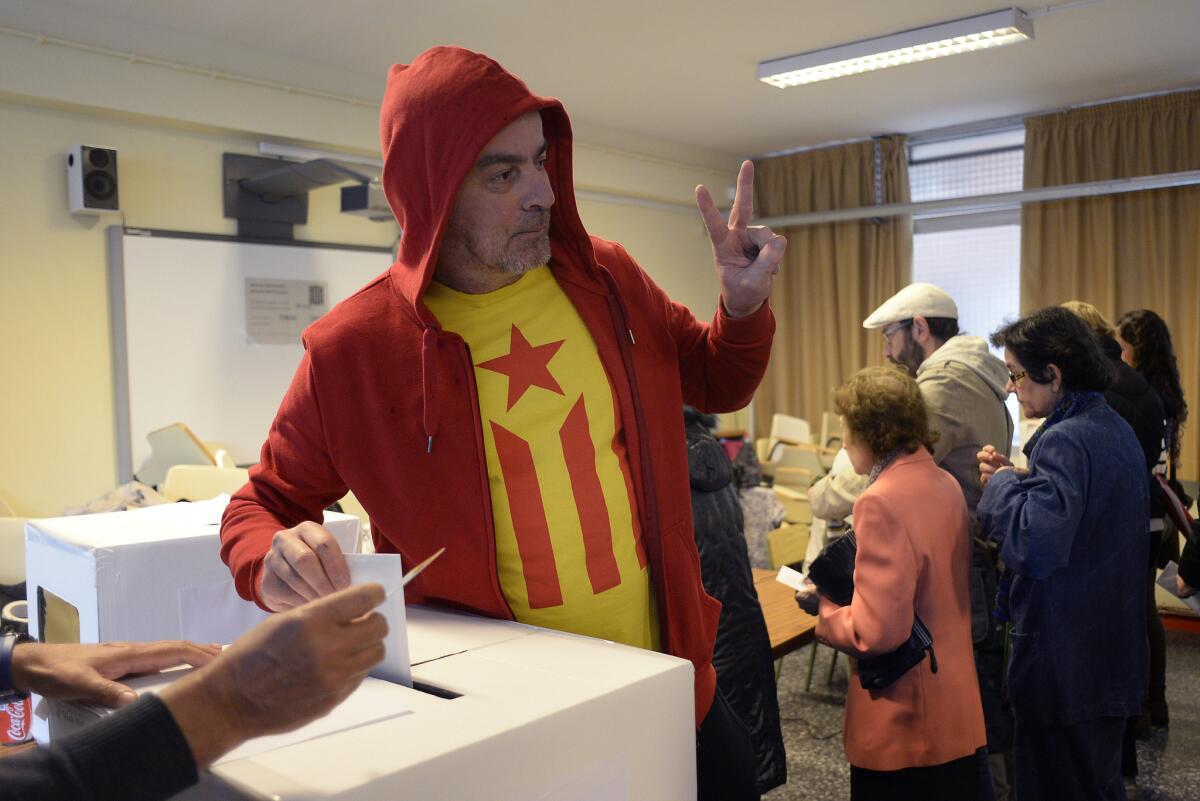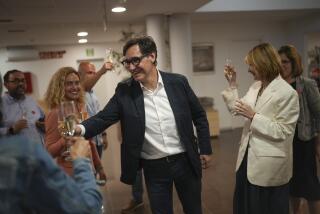Catalan voters favor independence from Spain, early results show

- Share via
Reporting from Barcelona, Spain — More than 80% of voters participating in Catalonia’s weekend independence poll endorsed breaking away from Spain, initial results showed early Monday.
The northeastern region held an unofficial, nonbinding secession vote Sunday, in violation of Spanish law. The poll was administered by 40,000 volunteers rather than civil servants.
Catalan officials said about 2.25 million people cast ballots — roughly half of eligible voters in the region of 7.5 million. It was one of the biggest endorsements of Catalan independence; in regional elections in 2012, 1.7 million Catalans voted for secessionist parties.
“In my opinion the turnout has been excellent, outstanding, even impressive,” Catalan President Artur Mas told reporters. “Like Quebec, like Scotland, Catalonia also wants to decide its political future — and we have the same right to decide it.”
With most ballots counted, just under 81% of voters answered “yes, yes” on Sunday’s two-part ballot, Catalan Vice President Joana Ortega announced.
The questions: “Do you want Catalonia to be a state? If so, do you want that state to be independent?”
Just 4.5% of voters said no to both questions.
Despite a drizzle, long lines of voters snaked through Barcelona’s Gothic Quarter, and turned out at more than 1,300 polling stations regionwide. The Catalan capital had been transformed into a giant get-out-the-vote rally, with outdoor concerts and speeches, and whole families draped in Catalan flags. On a wide central thoroughfare closed to traffic, monitors played video of the Berlin Wall coming down 25 years ago and Nelson Mandela campaigning against apartheid in South Africa, mixed in with images from Catalonia’s own history.
Organizers hoped a robust turnout might force Madrid to negotiate more autonomy for Catalonia. But Spanish Justice Minister Rafael Catala called Sunday’s vote “a useless, sterile simulation.”
“The [Spanish] government believes we have seen a day of political propaganda organized by pro-independence forces, lacking any kind of democratic validity,” Catala said in a televised statement.
Catalans have long sought autonomy from the Spanish central government in Madrid, but this was the first time they voted explicitly on it. Many were on the losing side of Spain’s 1936-39 Civil War, and suffered repression under the nearly four decades of military rule that followed, during which their language and local holidays were banned. More recently, in Spain’s economic crisis, many Catalans believed their wealthy region was unfairly subsidizing poorer parts of the country.
In the short term, it was unlikely Spain’s Constitution would be amended to allow for a U.S.-style federal system in which Madrid might grant statehood to Catalonia, said Sofia Perez, a Spanish political scientist at Boston University.
“More likely, I think, is a return to negotiations over the way in which Catalonia is financed, and some sort of compromise that would allow Catalonia to retain a larger share of the income taxes that are raised in Catalonia,” Perez said.
A team of international observers led by a British member of the European Parliament, Ian Duncan, visited several polling stations in Catalonia on Sunday and issued a report saying the process “took place in a calm and open manner where no one was coerced or intimidated.”
Because voters knew ahead of time that the poll’s results would be nonbinding and unrecognized, experts said results were likely to be skewed toward independence, drawing more participation by those in favor of change, than the status quo.
“The problem is that people who don’t want this are afraid to speak out,” said Susana Beltran, a member of Catalan Civil Society, a local group opposed to Sunday’s vote. “They don’t want problems with their friends, with their jobs, in life in general.”
Beltran did not vote and encouraged others to stay home. Among those who did vote was Clara Sen, 41, who took her two young daughters with her to a polling station in Barcelona.
“We try to explain that this is a peaceful process, and that it’s important to say what you think,” she said.
Frayer is a special correspondent.
More to Read
Sign up for Essential California
The most important California stories and recommendations in your inbox every morning.
You may occasionally receive promotional content from the Los Angeles Times.











